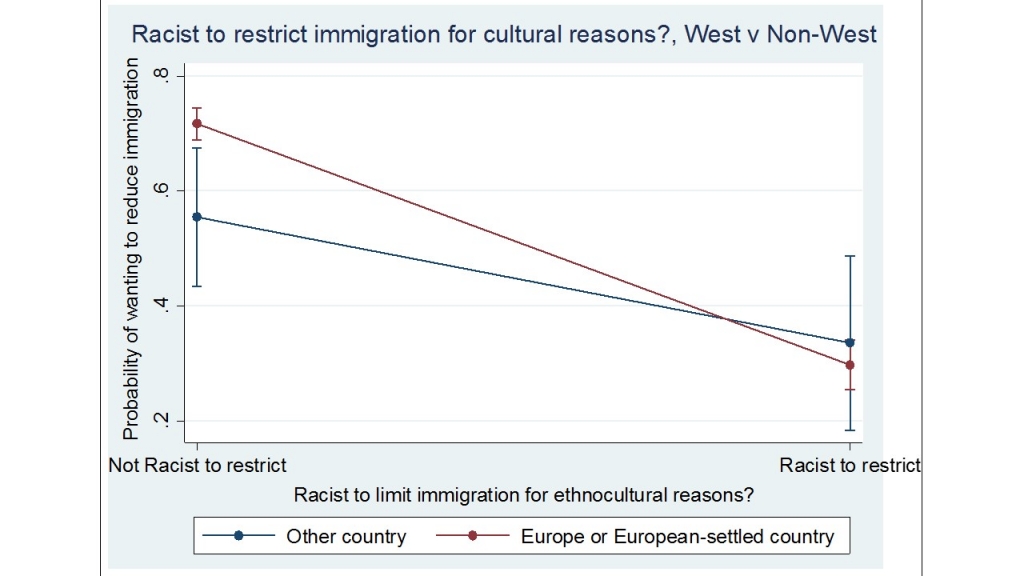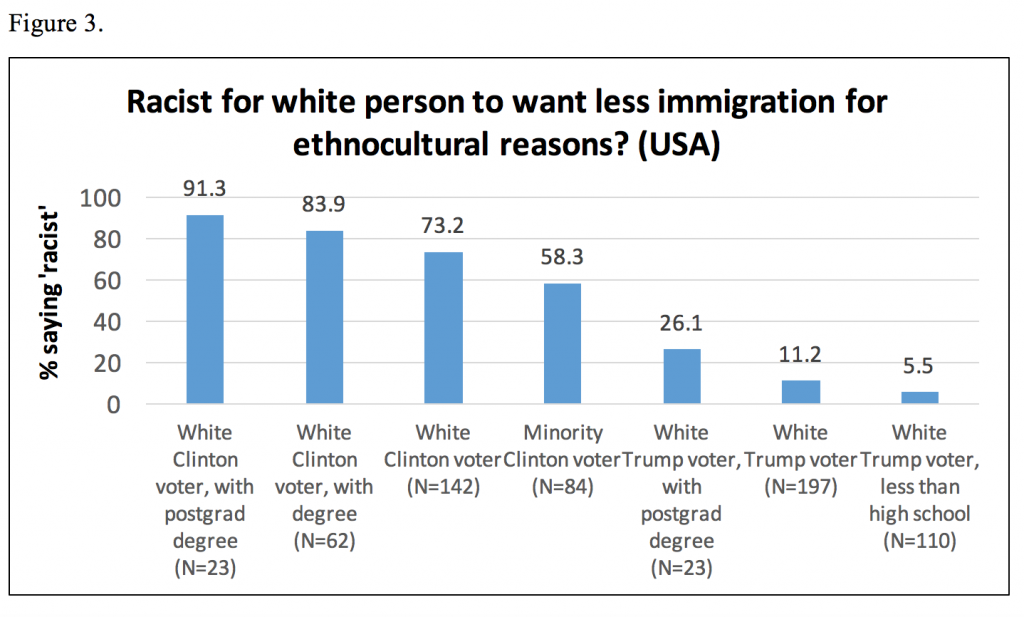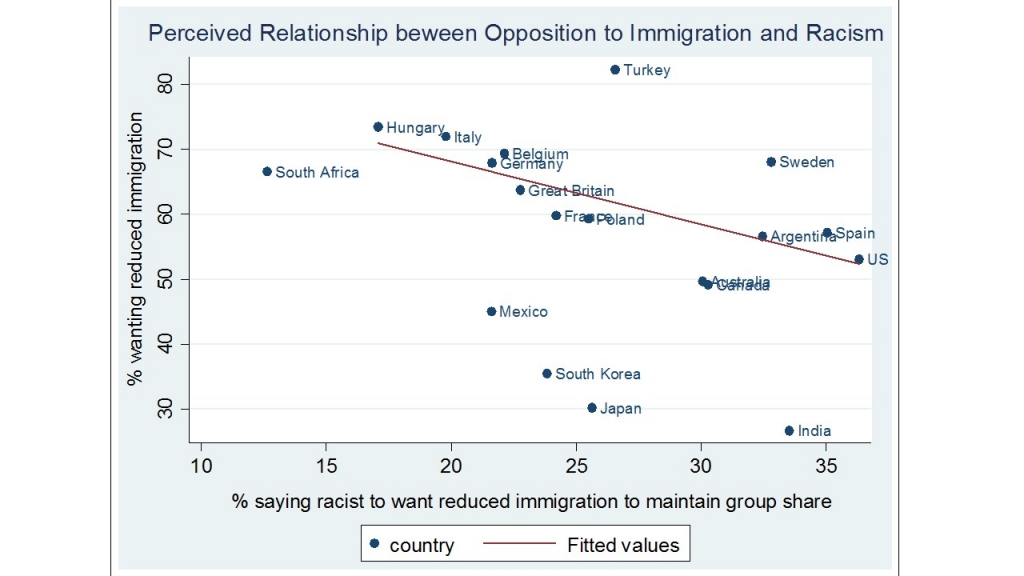 Are ethnically-motivated restrictions on immigration racist? Eric Kaufmann draws on new data from an 18-country survey to explain how people answered this question and how their answer affects their own support for higher or lower immigration levels.
Are ethnically-motivated restrictions on immigration racist? Eric Kaufmann draws on new data from an 18-country survey to explain how people answered this question and how their answer affects their own support for higher or lower immigration levels.
Trump, Brexit and the European populist right herald a new cleavage between globalists and nationalists, in which immigration is a defining issue. What’s more, new survey data suggests this hinges on a fundamental difference of opinion in western societies between highly-educated liberals, who consider the ethno-communal desire to reduce immigration racist, and conservatives, who don’t. This matters greatly because to be racist is, for most people, to be immoral – transgressing the social norms which define good and evil.
New data from an 18-country Ipsos-Mori survey indicates that people’s view of whether immigration should be higher or lower is strongly linked to whether they think it’s racist for a member of the ethnic majority to want less immigration to help maintain their group’s population share.
This relationship between antiracist norms and desired immigration levels holds in virtually all countries but is especially pronounced in Europe and its offshoots. Essentially, this new ‘culture war’ revolves around whether tribal desires for less immigration represent racism or a legitimate – if illiberal – form of group attachment.
Why is this important? Hostility to immigration is recognised as the most important predictor of support for populist right parties, like the Front National or leaders such as Donald Trump. Typically, those who study these phenomena try to explain what’s making people upset: is the culprit economic inequality, pressure on services, cultural change or a mistrust of established politicians?
Antiracism norms have received less scholarly attention. Yet psychologists tell us attitudes on sensitive policy questions such as immigration are the outcome of competing cognitive processes. Our automatic, or ‘implicit’ response is fast-thinking, but we then control this impulse to comply with learned social norms. This cross-pressuring has given rise to what Scott Blinder, Elisabeth Ivarsflaten and Robert Ford term the ‘dual-process’ model of attitude formation. Research in this area is limited, but confirms that right-wing populist parties with fascist pasts are less successful because they are viewed as beyond the pale defined by antiracist norms. Individuals who express a high motivation to control prejudice, even if opposed to immigration, are less likely to back populist right parties. People not only control their responses when in front of others, they internalise these norms so they self-censor in private.
Other work suggests norms not only lead people to frown on voting for the far right, but even prompt them to hide their views on immigration. Using a ‘list experiment’ that measures average sentiment but permits individuals to conceal their answers, Alexander Janus discovered that 60% of White Americans supported cutting immigration to zero when their identities were concealed, compared to 39% when their identities were known to the researcher. Self-censorship was especially pronounced among the university-educated.
Similarly, a recent experiment by Leonardo Bursztyn and colleagues found that 54% of Americans were prepared to donate to an anti-immigration organisation associated with maintaining a white majority if their anonymity was assured. This dropped to 34% among those told that researchers might contact them in a follow-up. Soon after Trump’s victory, however, the difference between the two conditions fell away, suggesting Trump’s win had altered social norms, making it more respectable to express ethnonationalist anti-immigration attitudes.
The Survey
New data comes from a question included in an Ipsos-Mori survey fielded (15 March 2017) covering over 14,000 respondents in 18 countries. The question probed people’s views on whether ethnically-motivated restrictions on immigration should be considered racist or not. The debate stems from an article by Shadi Hamid of the Brookings Institution in late 2016 in which Hamid contends that white ‘racial self-interest’ should be distinguished from white racism. Some forms of white racial self-interest, such as favouring whites as job applicants, are racist, but for Hamid, others – such as seeking to protect demographic share – are not. Did people in the countries under study agree with Hamid? By and large yes, but there were wide variations by education level and immigration opinion.
People first answered a standard question on their preferred level of immigration on a five-point scale, from ‘reduce a lot’ to ‘increase a lot’. They were then asked the following: ‘A [member of the ethnic majority] who identifies with her group and its history supports a proposal to reduce immigration. Her motivation is to maintain her group’s share of the population for cultural reasons. Is this person a) racist, b) racially self-interested, which is not racist, c) don’t know.’ The group name was adjusted for each country. For instance, in Britain, the member of the ethnic majority was ‘White Briton,’ in the US ‘White American,’ and in India, ‘Hindu’.
Aggregated to country level, with ‘don’t know’ responses excluded, the first clear finding is that a majority of people do not think it’s racist to want less immigration for ethnocultural reasons. The proportion considering this motivation racist varies, however, from 36% in the US to 13% in South Africa (where Xhosa was listed as the preponderant ethnic group). Divides within countries also matter. In Canada, 37% of English-Canadians say the sentiment is racist – similar to the US – while just 15% of Quebeckers do. In Belgium, 32% of Brussels residents but only 19% of those in Flanders agree.
The higher the proportion in a country who believe it’s racist to restrict immigration to maintain group share, the larger the proportion willing to accept current or higher levels of immigration. This is not particularly surprising. It could be argued that asking whether immigration restriction is racist or racially self-interested is simply another way of measuring immigration attitudes. But the data show that things aren’t so simple. For instance, it’s possible for someone to support immigration as a boost to economic growth or a country’s working age population without thinking group-motivated restrictions violate antiracist norms.
Across all countries, most say ethnocultural restriction is not racist but among pro-immigration respondents, views are more evenly split. 51% who back current or higher levels of immigration say a person seeking lower immigration for ethnocultural reasons is racist, and 49% say this is racial self-interest, which is not racist.
Alternatively, someone may want fewer immigrants to reduce pressure on public services while agreeing that a person who favours less immigration for explicitly ethnic reasons is racist. Indeed, we find that 12% of those who want less immigration agree that someone who wants fewer immigrants for tribal reasons is racist.
The racism v. racial self-interest divide strongly predicts variation in support for immigration, but is only part of the story. For instance, regardless of moral sentiment, countries such as Turkey or Sweden which have recently received large numbers of Syrian refugees, want less immigration.
What is especially interesting, though, is that the antiracism-pro immigration relationship holds more strongly in European-descended societies than elsewhere. The line of best fit for western countries is shown in red in figure 1. Notice that India, South Korea, Japan, Mexico, and Turkey fall well outside the line. This underscores the sharper value cleavage emerging in the West.
Figure 1
Source: Ipsos-Mori Global @dvisor Survey, 18 countries, 15 March 2017. N=14,014. Aggregated data.
The fact the relationship is tighter in Europe and its offshoots suggests antiracist immigration norms divide opinion on immigration more in western contexts. This is confirmed in the individual-level data presented in figure 2, where the red line for the western cases (including Hungary and Poland) is steeper than the blue line for non-western countries. In the West, a person of average age, income, and education who thinks an ethnocultural motivation for reducing immigration is racist has just a 30% likelihood of wanting immigration reduced. This jumps to a 72% likelihood among those who say this is not racist. Outside the West, the difference in probabilities is only half as large, at 55-34%. In essence, norm conflict divides immigration opinion in the West more sharply than it does outside it.
Figure 2
 Source: Ipsos-Mori Global @dvisor Survey, 18 countries, 15 March 2017. N=14,014. Non-European countries: India, South Korea, Japan, Mexico, Turkey, South Africa. Controls for individual’s education, income, gender and age.
Source: Ipsos-Mori Global @dvisor Survey, 18 countries, 15 March 2017. N=14,014. Non-European countries: India, South Korea, Japan, Mexico, Turkey, South Africa. Controls for individual’s education, income, gender and age.
Education also counts. In many countries, the university-educated are 10-25 points more likely than those lacking high school qualifications to think that a person who wants less immigration for ethnocultural reasons is racist. The biggest education gap on this issue, at 26 points, is in Germany.
The international data don’t permit us to discern how ideology and voting divide opinion, but two Birkbeck-Policy Exchange-Yougov surveys of around 2600 Americans and 1600 Britons I conducted in December 2016 asking the same question, indicates that partisanship largely maps to this value cleavage.
As figure 3 reveals, among White Clinton voters with postgraduate degrees, support for the idea that it’s racist to want reduced immigration for ethnocultural reasons is almost total, at over 91%. By contrast, only 11.2% of Trump voters agree. Minority voters are slightly more likely to back the ‘racist’ interpretation than whites, 45-36, but this 12-point difference is dwarfed by the 62-point gap within White America between Clinton and Trump voters.
 Birkbeck-Policy Exchange-Yougov survey, 7-8 December, 2016.
Birkbeck-Policy Exchange-Yougov survey, 7-8 December, 2016.
In a British version of the survey fielded on the same dates, I found that 80% of university-educated White British Remainers who favour current or higher immigration said the sentiments were racist. This falls to 45% for all White British Remainers and plummets to just 6% among White British Leavers – zero among those without qualifications.
The results of the Ipsos-Mori and Yougov surveys point to value conflict over the legitimate reasons for restricting immigration. Should antiracism norms sideline ethnocultural arguments for reduced immigration, compelling restrictionists to define their interests in material terms (i.e. reducing pressure on jobs or housing)? Polarization over these questions is keenest in the West. Populist right figures such as Trump champion ethnonationalism and deride political correctness while those who defend the idea that antiracist norms should shape immigration levels urge cosmopolitan young ‘Anywheres’ to the polls to combat the spectre of racism.
_______
About the Author
 Eric Kaufmann (@epkaufm) is Professor of Politics at Birkbeck College and is writing a book about the White majority response to ethnic change in the West (Penguin).
Eric Kaufmann (@epkaufm) is Professor of Politics at Birkbeck College and is writing a book about the White majority response to ethnic change in the West (Penguin).







Interesting there are no Trump minority voters in the poll. Is that telling?
A few years back BBC interviewed immigrants from Pakistan who opposed Polish immigrants. They said their own children had trouble finding work and housing.
What attitudes about immigration do the sending countries have?
Is it racist to want to increase the members of your own race if you are not white?
Barbara Jordan Chair, U.S. Commission on Immigration Reform under President Clinton, wanted to reduce legal immigration and deport illegals because it hurt American workers.
Legal Hispanic immigrant and Harvard economist George Borjas has studied the effects of immigration and wages for over 30 years. The U.S. immigration system redistributes wealth. Although GDP may increase all the gains go to the immigrant and their employer- at the expense of the native workers.
Immigration has a harmful effect on the earnings of low-skill workers
https://gborjas.org/2016/09/21/a-users-guide-to-the-2016-nas-immigration-report/
Very interesting. Current immigration policies are in short order going to demographically overwhelm the founding populations of most W European countries and their offshoots in N America. While this study frames the question as one of ‘Is it Racist?’, it would be interesting to dig deeper and see if the ‘suicidal altruism’ that seems endemic to ethnic Western Europeans is more prevalent at higher IQs, or is this nature nurtured by the ideologies espoused in the modern academy?
Is Diversity our strength? i don’t think Robert Putnam would agree.
Add to that endlessly repeated catechism the daffy idea that we should encourage multiculturalism in a Diverse society and you have the recipe for balkanized civil war(in the good ol’USA).
Multiculturalism completely negates the idea of Assimilation which is the only way a country can stay a country with a large population of immigrants and 1.5 million arriving every year.
It might work with an overwhelming number of one ethnicity to which the others would be forced to conform to their rituals but once the critical mass is reached, say a third, a third, a fifth and a fifth then you can count on voting on racial lines and perhaps civil disturbances degenerating into chaotic civil war.
Former prime Minister of Singapore Lee Kuan Yew said,
“In multiracial societies, you don’t vote in accordance with your economic interests and social interests, you vote in accordance with race and religion.”
Good luck with that Kids.
Very interesting research. Given the demographic trend in Africa (population headed toward 4 billion by 2100, from a 1950 level of 224 million) the liberal elite’s moral aversion to discussing immigration openly, whenever there is a race-related feature, could be quite disastrous for Western Europe. Much of Western Europe might be effectively absorbed into the demographically-dominant societies of Africa and the Middle East. While that is happening, no one will dare mention it openly in public discussions. Perhaps a new, updated, moral code is needed for public discussions of these issues.
How about turning the question on its head: “Is it racist to implement mass non-white immigration into the USA for the purpose of reducing the percentage of white gentiles in the American population?”
This analysis, I’m afraid, starts from the lazy assumption that the motivations for objecting to unlimited immigration are, in fact, racist and ethnically-based, while the prejudiced racists may be forced by social disapproval to reframe their (our) objections in non-racist terms.
While I can’t speak to the experience of Americans, or those in other EU countries, the ‘anti-immigrant’ sentiment in the UK has usually peaked when UK jobs and social conditions have been poor. This was true as far back as the 16th and 17th centuries, when French and Belgian Protestants fled to England to escape persecution, through the Windrush generation and large-scale immigration from post-independence India and Pakistan, to the current influx of young migrants from the newer EU countries.
The common denominator is not racial hatred; it’s the imposition by government and employers of poor working and social conditions, and inadequate housing for the settled population (regardless of ethnicity – the same sentiments are expressed by second-generation immigrants and long-term foreign residents as by the several-generation British) at the same time as their encouragement of unconnected foreigners to take jobs below their academic and professional abilities.